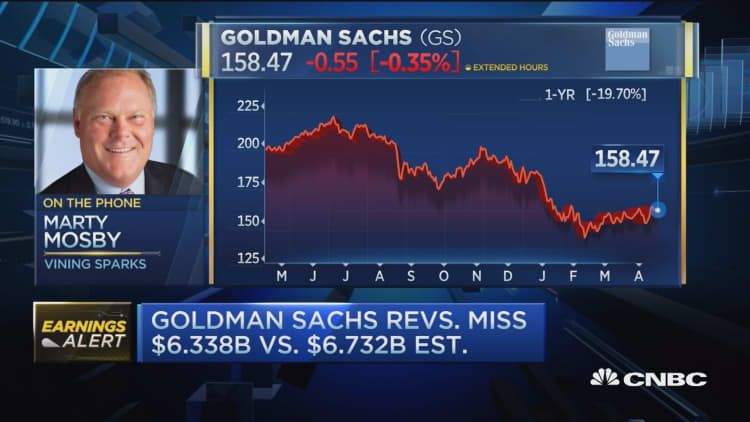
Goldman Sachs reported first-quarter earnings that topped lowered Wall Street expectations. But revenue missed estimates and plummeted about 40 percent from the year ago period.
"We have seen most of the other money center banks beat on the revenue side. But Goldman was right in the 'eye of the storm' that hit here in the first quarter," Vining Sparks bank analyst Marty Mosby told CNBC's "Squawk Box," referring to the worst start of a year on Wall Street ever.
"What he had was a freeze of activity. When we had the market disruptions that January and February represented, you just didn't have equity trades, you didn't have any underwriting, [and] you had not deals coming to the street," he added.
Shares of Goldman Sachs fell in premarket trading immediately following the report. (Get the latest quote here.)
Goldman — the last of the big U.S. banks to release first-quarter results — saw a more than 50 percent decline in adjusted earnings to $2.68 per share for the first three months 2016, the fourth-straight quarter of profit declines.
It was a tough year-over-year comparison, since first quarter 2015 was the firm's best quarterly profit in five years.
Revenue for first-quarter 2016 came in at $6.34 billion, compared to $10.62 billion in the year-ago period.
Analysts expected the banking giant to post earnings per share of $2.45 on revenue of $6.73 billion, according to a Thomson Reuters consensus estimate.
"The operating environment this quarter presented a broad range of challenges, resulting in headwinds across virtually every one of our businesses," Lloyd Blankfein, chairman and CEO, said in a statement.
As with other banks, Goldman's trading revenue was hit by sliding commodity and oil prices, worries about the Chinese economy, and uncertainty about U.S. interest rates.
Revenue from trading bonds, currencies and commodities fell about 47 percent to $1.66 billion, accounting for 26.2 percent of total revenue in the quarter — a far cry from the 40 percent the business regularly contributed before the 2008 financial crisis.
Goldman's traditional rival, Morgan Stanley, reported on Monday a 54 percent drop in adjusted revenue from fixed income and commodities trading and a similar drop in net profit.
Goldman shares have been under pressure in 2016, falling nearly 12 percent year to date. The stock, as of Monday's close, is also the greatest laggard among Dow components for the year, contributing just a 14-point gain to the Dow Jones industrial average.
Goldman Sachs in 2016
— CNBC's Matthew J. Belvedere and Reuters contributed to this report.


